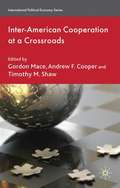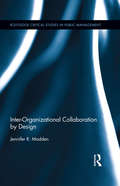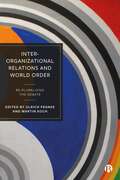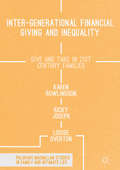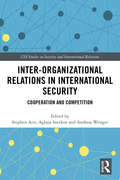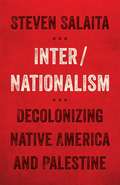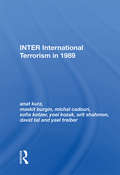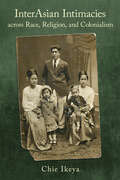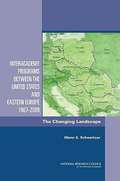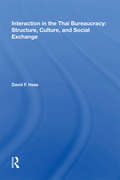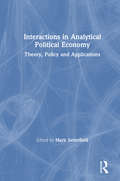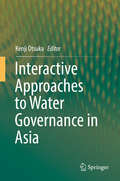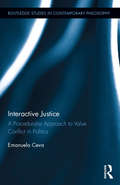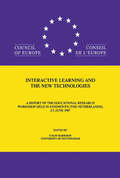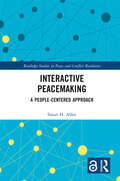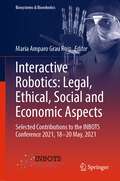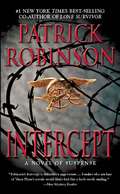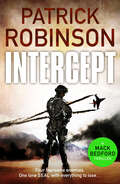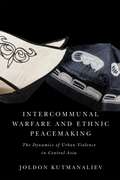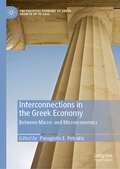- Table View
- List View
Inter-American Cooperation at a Crossroads
by Timothy M. Shaw Gordon Mace Andrew F. CooperFifteen years after the first Summit of the Americas, the world and the Americas have changed enormously. Competing strategies for economic development and political representation have shattered the hemispheric consensus of the 1990s. This book analyzes these developments and points towards a future for inter-American co-operation.
Inter-Organizational Collaboration by Design (Routledge Critical Studies in Public Management)
by Jennifer MaddenAlthough difficult, complicated, and sometimes discouraging, collaboration is recognized as a viable approach for addressing uncertain, complex and wicked problems. Collaborations can attract resources, increase efficiency, and facilitate visions of mutual benefit that can ignite common desires of partners to work across and within sectors. An important question remains: How to enable successful collaboration? Inter-Organizational Collaboration by Design examines how these types of collaborations can overcome barriers to innovate and rejuvenate communities outlining the factors and antecedents that influence successful collaboration. The book proposes a theoretical perspective for collaborators to adopt design science (a solution finding approach utilizing end-user-centered research, prototyping, and collective creativity to strengthen individuals, teams, and organizations), the language of designers, and a design attitude as an empirically informed pathway for better managing the complexities inherent in collaboration. Through an integrated framework, evidence-based tools and strategies for building successful collaboration is articulated where successful collaboration performance facilitates innovation and rejuvenation. This volume will be essential reading for academics, researchers, leaders and managers in nonprofit, private, and government sectors interested in building better collaborations.
Inter-Organizational Relations and World Order: Re-Pluralizing the Debate
by David Brewster Ulrich Franke and Martin KochWithin international relations scholarship, the nature of international organizations and their relationship with each other and nation-states has been widely contested. This edited volume brings together a team of experts to shed new light on inter-organizational relations in world politics. The book covers areas from the rule of law and international security to business and sport. Through its analysis, it demonstrates that, just as inter-organizational relations themselves are diverse and complex, research on this topic should also be pluralistic in order to draw new and valuable results and insights.
Inter-generational Financial Giving and Inequality
by Karen Rowlingson Ricky Joseph Louise OvertonThis book makes a major contribution to our understanding of 21st Century families in Britain through an exploration of intergenerational relationships. Drawing on new and extensive quantitative and qualitative research, the authors explore the giving and receiving of financial gifts. Despite growing concern about intergenerational tension and even possible conflict, the book finds evidence of a significant degree of intergenerational solidarity both within families at the micro level and between generations more generally within society (at the macro level) in Britain. However, given substantial inequalities within different generations- as a result, in particular, of social class divisions- some families are able to support each other far more than others. This means that strong intergenerational solidarity may lead to the entrenchment of existing intragenerational inequalities. The book will be of interest to scholars and students researching Sociology, Social Policy, Family Sociology, Generations and Intergenerational Relationships.
Inter-organizational Relations in International Security: Cooperation and Competition (CSS Studies in Security and International Relations)
by Andreas Wenger Stephen Aris Aglaya SnetkovThis book examines the politics of the relationships between multilateral organizations that have come to play a major role in contemporary efforts to manage international security. Drawing on concepts developed in Organizational Studies, the book starts from the assumption that inter-organizational relationships are the product of contested politics. Politics that may be either more cooperative or more competitive, but which always contains elements of both. This volume focuses on inter-organizational relations emanating from, through and towards the regional scale. The proliferation in the number of regional multilateral organizations in recent decades and their growing claims to represent effective and legitimate frameworks to address security threats and issues has been widely noted. The book is organized into four sections, covering all aspects of the inter-organizational relationships in which regional multilateral organizations are involved: global-regional, intra-regional, inter-regional, and multi-scalar. Each chapter addresses a distinct case study of inter-organizational relations (bilateral, trilateral or wider network), and examines the politics shaping these relations. This book will be of much interest to students of international security, international organizations, global governance and area studies, more generally.
Inter/Nationalism: Decolonizing Native America and Palestine (Indigenous Americas)
by Steven Salaita&“The age of transnational humanities has arrived.&” According to Steven Salaita, the seemingly disparate fields of Palestinian Studses and American Indian studies have more in common than one may think. In Inter/Nationalism, Salaita argues that American Indian and Indigenous studies must be more central to the scholarship and activism focusing on Palestine. Salaita offers a fascinating inside account of the Boycott, Divestment, and Sanctions (BDS) movement—which, among other things, aims to end Israel&’s occupation of Palestinian land. In doing so, he emphasizes BDS&’s significant potential as an organizing entity as well as its importance in the creation of intellectual and political communities that put Natives and other colonized peoples such as Palestinians into conversation. His discussion includes readings of a wide range of Native poetry that invokes Palestine as a theme or symbol; the speeches of U.S. President Andrew Jackson and early Zionist thinker Ze&’ev Jabotinsky; and the discourses of &“shared values&” between the United States and Israel. Inter/Nationalism seeks to lay conceptual ground between American Indian and Indigenous studies and Palestinian studies through concepts of settler colonialism, indigeneity, and state violence. By establishing Palestine as an indigenous nation under colonial occupation, this book draws crucial connections between the scholarship and activism of Indigenous America and Palestine.
Inter: International Terrorism In 1989
by Anat KurzThis annual publication contains statistical data on international terrorism in 1989, as well as brief analyses of key terrorism-related issues. Extensive tables are accompanied by a chronology of significant international terrorist events in 1989 and a glossary of terrorist organizations.
InterAsian Intimacies across Race, Religion, and Colonialism
by Chie IkeyaIn InterAsian Intimacies across Race, Religion, and Colonialism, Chie Ikeya asks how interAsian marriage, conversion, and collaboration in Burma under British colonial rule became the subject of political agitation, legislative activism, and collective violence. Over the course of the twentieth century relations between Burmese Muslims, Sino-Burmese, Indo-Burmese, and other mixed families and communities became flashpoints for far-reaching legal reforms and Buddhist revivalist, feminist, and nationalist campaigns aimed at consigning minority Asians to subordinate status and regulating women's conjugal and reproductive choices. Out of these efforts emerged understandings of religion, race, and nation that continue to vex Burma and its neighbors today.Combining multilingual archival research with family history and intergenerational storytelling, Ikeya highlights how the people targeted by such movements made and remade their lives under the shifting circumstances of colonialism, capitalism, and nationalism. The book illuminates a history of belonging across boundaries, a history that has been overshadowed by Eurocentric narratives about the mixing of white colonial masters and native mistresses. InterAsian intimacy was—and remains—foundational to modern regimes of knowledge, power, and desire throughout Asia.
Interacademy Programs between the United States and Eastern Europe 1967-2009: The Changing Landscape
by National Research Council of the National AcademiesInteracademy Programs Between the United States and Eastern Europe 1967-2009 documents how interacademy programs have played a significant role in establishing and maintaining American scientific contacts with colleagues in Eastern Europe prior to and following the lifting of the Iron Curtain. The book also discusses the changing roles of the academies of the region and the changing nature of interacademy cooperation that has emerged since 1991. The countries of interest are Poland, the Czech Republic, Slovakia, Hungary, Romania, Bulgaria, the former German Democratic Republic, and the countries that previously were united politically within the framework of the former Yugoslavia. The book should be of interest to officials and specialists in both the United States and the countries of Eastern Europe who are actively engaged in promoting scientific cooperation through bilateral and other channels. Also, an emerging audience for this book is the growing group of analysts in the United States interested in "science diplomacy" involving U.S. cooperation with countries that have political agendas that differ in important respects from the objectives of U.S. policies.
Interaction In The Thai Bureaucracy: Structure, Culture, And Social Exchange
by David F. HaasPresenting the results of seventeen months of field research, conducted entirely in the Thai language, this study describes and compares the patterns of social exchange of two groups of Thai officials: district-level bureaucrats and physicians in a provincial hospital. Dr. Haas uses a unique combination of anthropological field data and survey rese
Interactional Competences in Institutional Settings
by Laurent Filliettaz Simona Pekarek Doehler Adrian Bangerter Geneviève De Weck Esther González-Martínez Cécile PetitjeanThis interdisciplinary volume brings together leading scholars from several disciplines to uncover the key to young people's socialization within institutional settings, from school to the workplace. Among the questions they consider are: what aspects of interactional competence are relevant for participation in practical activities within those settings? What are the interactional procedures through which diverse facets of interactional competence are recognized, legitimized and assessed in the course of practical activities? How do these procedures shape and reflect social institutions and people's understanding of them? The collection discusses interactional competences across a variety of institutional settings, and reflects on the institutional order by scrutinizing how such competences are interactionally treated within everyday institutional practices. The volume enriches an interdisciplinary understanding of fundamental concepts in the social sciences and will therefore be of interest to those working within linguistics, sociology, education, psychology of work, and speech therapy.
Interactions in Analytical Political Economy: Theory, Policy, and Applications
by Mark SetterfieldIn this interactive collection of essays, many of the leading proponents of analytical political economy examine major macroeconomic issues through the integration of mathematical analysis and non-neoclassical economic theory. The topics covered include the macroeconomics of the labor market, open economy issues, economic growth, and macroeconomic policy. The chapter-comment-reply format of the book creates a genuine dialogue on each theme, and evokes a sense of unfolding debate which draws the reader into the discussion.
Interactive Approaches to Water Governance in Asia
by Kenji OtsukaThis book applies interactive perspectives, which have historically mainly been discussed in the context of Western European countries, to case studies on water governance in Asia. It examines how these perspectives can be used to reveal complex and dynamic interactions in water governance in Asia, and how interactions between policies and practices, as well as those between formal institutes and emerging informal institutes, come to pass. In two introductory chapters and seven case studies in Asia (two from China, and each one from Japan, Thailand, the Philippines, Indonesia, and India), the book reveals the interactive forms currently emerging in Asia under hierarchical but often fragmented administrative systems. In addition, it explores emerging hybrid forms of interactive governance, which bring together governmental and non-governmental actors, and discusses how the expected role of government and roles of non-governmental actors could be changed to solve problems in a more cooperative manner. In this context, researchers from outside the locality could play an important role, helping facilitate such forms of interactive governance. The book offers extensive information on the essential features of interactive forms, and on the role of such transdisciplinary approaches, making it a valuable resource not only for scholars and university students, but also for policymakers and grass-roots practitioners directly involved in the interactive process of water governance.
Interactive Democracy
by Carol C. GouldHow can we confront the problems of diminished democracy, pervasive economic inequality, and persistent global poverty? Is it possible to fulfill the dual aims of deepening democratic participation and achieving economic justice, not only locally but also globally? Carol C. Gould proposes an integrative and interactive approach to the core values of democracy, justice, and human rights, looking beyond traditional politics to the social conditions that would enable us to realize these aims. Her innovative philosophical framework sheds new light on social movements across borders, the prospects for empathy and solidarity with distant others, and the problem of gender inequalities in diverse cultures, and also considers new ways in which democratic deliberation can be enhanced by online networking and extended to the institutions of global governance. Her book will be of great interest to scholars and upper-level students of political philosophy, global justice, social and political science, and gender studies.
Interactive Justice: A Proceduralist Approach to Value Conflict in Politics (Routledge Studies in Contemporary Philosophy)
by Emanuela CevaContemporary societies are riddled with moral disputes caused by conflicts between value claims competing for the regulation of matters of public concern. This familiar state of affairs is relevant for one of the most important debates within liberal political thought: should institutions seek to realize justice or peace? Justice-driven philosophers characterize the normative conditions for the resolution of value conflicts through the establishment of a moral consensus on an order of priority between competing value claims. Peace-driven philosophers have concentrated, perhaps more modestly, on the characterization of the ways in which competing value claims should be balanced, with a view to establishing a modus vivendi aimed at containing the conflict. Interactive Justice addresses an important question related to this debate: on what terms should the parties interact during their conflict for their interaction to be morally acceptable to them? Although largely unexplored by political philosophers, this is a main area of concern in conflict management. Building on a proceduralist interpretation of "relational" concerns of justice, the author develops a liberal normative theory of interactive justice for the management of value conflict in politics grounded in the fundamental values of fair hearing and procedural equality. This book innovatively builds a bridge between works in political philosophy and peace studies to propose a fresh lens through which to view the normative responses liberal institutions ought to give to value conflict in politics, and moves beyond the apparent dichotomy between pursuing end-state justice through conflict resolution or peace through conflict containment.
Interactive Learning & The New
by Colin HarrisonThis book compares research findings on particular topic of interactive learning to identify areas of research, and discusses possibilities of research co-operation. It presents an argument that in the UK the emphasis on small group work using a microcomputer is the result of pedagogical opinion.
Interactive Peacemaking: A People-Centered Approach (Routledge Studies in Peace and Conflict Resolution)
by Susan H. AllenThis book examines the theory and practice of interactive peacemaking, centering the role of people in making peace. The book presents the theory and practice of peacemaking as found in contemporary processes globally. By putting people at the center of the analysis, it outlines the possibilities of peacemaking by and for the people whose lives are touched by ongoing conflicts. While considering examples from around the world, this book specifically focuses on peacemaking in the Georgian-South Ossetian context. It tells the stories of individuals on both sides of the conflict, and explores why people choose to make peace, and how they work within their societies to encourage this. This book emphasizes theory built from practice and offers methodological guidance on learning from practice in the conflict resolution field. This book will be of much interest to students and practitioners of peacemaking, conflict resolution, South Caucasus politics and International Relations.
Interactive Robotics: Selected Contributions to the INBOTS Conference 2021, 18-20 May, 2021 (Biosystems & Biorobotics #30)
by María Amparo Grau RuizThis book reports on cutting-edge legal, ethical, social and economic issues relating to robotics and automation, human-machine interaction and artificial intelligence, in different application areas. It discusses important problems such as robotic taxation, social inequality, protection of neuro-human and children rights, among others. It describes current advances and challenges in robotic regulation and governance, as well as findings relating to sustainability of robotic industries, thus filling an important gap in the robotic and AI literature. Chapters consists of revised and extended contributions to the workshop session “Debate on legal, ethical & socio-economic aspects of interactive robotics” of INBOTS 2021, held virtually on May 18-20, 2021.
Intercept
by Patrick RobinsonA left-leaning appeal court judge liberates four of the most dangerous al-Qaeda terrorists from Guantanamo Bay and the CIA field officers track them back to Pakistan’s northwest frontier mountain range. But disaster overtakes them and the four men vanish, to rejoin the dark and mysterious forces trained by Osama bin Laden high in the Hindu Kush. These are men with hatred in their hearts, with hatred for the United States and Great Britain, and they are sworn to hit back at the USA, which imprisoned so many of their high command. A fateful communication from the mountains of the Afghan side of the border is intercepted by Britain’s secret surveillance station on the Mediterranean island of Cyprus. Al-Qaeda is almost certainly planning a new hit on the US mainland. The CIA is at its wits end, all their fears coming home to roost. They know there is only one man who can stop them-retired Navy SEAL Lt. Commander Mack Bedford-and he is called in to assist on one of the most highly classified missions ever launched from CIA headquarters. Bedford names his price, and once more, the nobility of the man is spun into a breathtakingly fast action novel.
Intercept
by Patrick RobinsonA left-leaning appeal court judge liberates four of the most dangerous al-Qaeda terrorists from Guantanamo Bay and the CIA field officers track them back to Pakistan's northwest frontier mountain range. But disaster overtakes them and the four men vanish, to rejoin the dark and mysterious forces trained by Osama bin Laden high in the Hindu Kush. These are men with hatred in their hearts, with hatred for the United States and Great Britain, and they are sworn to hit back at the USA, which imprisoned so many of their high command.A fateful communication from the mountains of the Afghan side of the border is intercepted by Britain's secret surveillance station on the Mediterranean island of Cyprus. Al-Qaeda is almost certainly planning a new hit on the US mainland. The CIA is at its wits end, all their fears coming home to roost.They know there is only one man who can stop them-retired Navy SEAL Lt. Commander Mack Bedford-and he is called in to assist on one of the most highly classified missions ever launched from CIA headquarters. Bedford names his price, and once more, the nobility of the man is spun into a breathtakingly fast action novel.
Intercept
by Patrick RobinsonA left-leaning appeal court judge liberates four of the most dangerous al-Qaeda terrorists from Guantanamo Bay and the CIA field officers track them back to Pakistan's northwest frontier mountain range. But disaster overtakes them and the four men vanish, to rejoin the dark and mysterious forces trained by Osama bin Laden high in the Hindu Kush. These are men with hatred in their hearts, with hatred for the United States and Great Britain, and they are sworn to hit back at the USA, which imprisoned so many of their high command.A fateful communication from the mountains of the Afghan side of the border is intercepted by Britain's secret surveillance station on the Mediterranean island of Cyprus. Al-Qaeda is almost certainly planning a new hit on the US mainland. The CIA is at its wits end, all their fears coming home to roost.They know there is only one man who can stop them-retired Navy SEAL Lt. Commander Mack Bedford-and he is called in to assist on one of the most highly classified missions ever launched from CIA headquarters. Bedford names his price, and once more, the nobility of the man is spun into a breathtakingly fast action novel.
Intercept
by Patrick RobinsonA left-leaning appeal court judge liberates four of the most dangerous al-Qaeda terrorists from Guantanamo Bay and the CIA field officers track them back to Pakistan's northwest frontier mountain range. But disaster overtakes them and the four men vanish, to rejoin the dark and mysterious forces trained by Osama bin Laden high in the Hindu Kush. These are men with hatred in their hearts, with hatred for the United States and Great Britain, and they are sworn to hit back at the USA, which imprisoned so many of their high command.A fateful communication from the mountains of the Afghan side of the border is intercepted by Britain's secret surveillance station on the Mediterranean island of Cyprus. Al-Qaeda is almost certainly planning a new hit on the US mainland. The CIA is at its wits end, all their fears coming home to roost.They know there is only one man who can stop them-retired Navy SEAL Lt. Commander Mack Bedford-and he is called in to assist on one of the most highly classified missions ever launched from CIA headquarters. Bedford names his price, and once more, the nobility of the man is spun into a breathtakingly fast action novel.
Intercept (The Mack Bedford Military Thrillers)
by Patrick RobinsonAn ex–Navy SEAL joins a top-secret mission to halt a deadly terrorist attack in this military thriller by a #1 New York Times–bestselling author. An appeal court judge frees four of the world's most dangerous terrorists from Guantanamo Bay. The CIA tracks them back to Pakistan&’s North-West Frontier, but then the men vanish. Fortunately, a communication from the Afghan side of the border is intercepted by Britain&’s secret surveillance station in Cyprus. Al-Qaeda is plotting a devastating attack. The CIA panics, its greatest fears realized. Retired Navy SEAL Mack Bedford is called in to assist one of the most highly classified missions ever launched from CIA headquarters, with the stakes higher than ever before . . . A breathtaking and unputdownable action thriller, Intercept is ideal for fans of James Phelan and Chris Ryan.Praise for the writing of Patrick Robinson &“One of the crown princes of the beach-read thriller.&” —Stephen Coonts, New York Times–bestselling author of The Disciple&“Patrick Robinson has tapped into our fear.&” —Torquay Herald Express &“Robinson [crafts] a fast-paced, chilling, yet believable tale.&” —San Francisco Examiner
Intercommunal Warfare and Ethnic Peacemaking: The Dynamics of Urban Violence in Central Asia (McGill-Queen's Studies in Protest, Power, and Resistance)
by Joldon KutmanalievWith increasing urban population density, conflicts in cities erupt more frequently and violently. Cities have become hotspots for armed combat, highlighting the urgency of understanding the impact of local communities and urban factors on the development of violent conflict. Joldon Kutmanaliev presents a novel approach to analyzing communal violence and armed conflicts in urban zones. Drawing from fieldwork in cities of southern Kyrgyzstan, he explains local-level variations in violence across neighbourhoods during the most intense and violent episode of urban communal violence in Central Asia – the clashes between Kyrgyz and Uzbeks in June 2010. Kutmanaliev explains why armed violence affects some urban neighbourhoods but not others, why local communities react differently to the same existential threat, how they deal with a deteriorating security environment and interethnic fears, and how different types of urban planning and urban landscapes influence the spread of violence. Importantly, the book identifies key factors that help local communities and their leaders to negotiate non-aggression pacts and control local constituencies, and therefore successfully prevent violence.Intercommunal Warfare and Ethnic Peacemaking explains communal war and ethnic peacemaking on the level of neighbourhood communities – a perspective that is largely absent in previous studies.
Interconnections in the Greek Economy: Between Macro- and Microeconomics (The Political Economy of Greek Growth up to 2030)
by Panagiotis E. PetrakisThis book examines the economic interconnections of the Greek economy at a macro and micro level, allowing it to explore both the economic relations between the various sectors and the interconnections of various companies and overlaps in management boards. Two approaches are used to quantify interdisciplinary and cross-sectoral interfaces: the traditional input-output analysis approach and the “influence and information flow” approach through network analysis. The book's first part presents the current conditions and the economic interconnections within the Greek economy. In the second part, during the analysis of microeconomic interconnections between individuals and companies, a much more thorough presentation of the economic interconnections of Greek companies is established. Finally, the book’s third part presents how the Greek economy must transform its production prototype under structural constraints and opportunities for economic diversification and inclusive growth and under the pressure of economic shocks and uncertainty.
